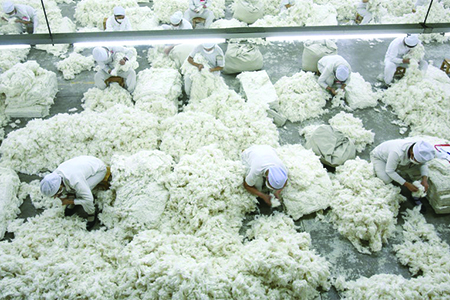
The US cuts off raw material imports from Xinjiang
YarnsandFibers News Bureau 2021-02-12 16:58:48 –The US government banned cotton and other raw material imports from Xinjiang, China due to reported allegations against the manufacturers. The allegations have been reported of forced labor in the region and the internment camps inhabiting Uighurs and other Muslims were reported to force them to work under inhumane conditions.
On January 19, Secretary of State Mike Pompeo declared China accused of genocide, citing widespread reports of torture, forced sterilization and restrictions on freedom of religion and expression in Xinjiang. As a result, many fashion brands such as Patagonia, Marks & Spencer and H&M had cut their ties with the suppliers in the region and it was expected for other brands to follow up the suit.
It has been estimated that 20% of the global cotton is being supplied by Xinjiang and the world's most famous apparel brands directly source raw materials from the region. The brands have increased the scrutiny of their Xinjiang operations, the complexity of supply chains in China's non-transparent environment makes it challenging for corporations to ensure that their goods are free of cotton produced via forced labor.
The fast-fashion brands such as H&M, Zara and Forever 21 put intense pressure on the workers in developing countries as they have to compete for the market demand of quick and affordable fashion, so abuse and violation of labor rights has always been a usual term in apparel supply chains. Workers' safety has always been compromised in the developing countries, where suppliers get razor-thin margins and tight lead times, so there is a lot to cope with within such factories. In the 1990s consumer forum played a very important role in checking illegal and unsafe labor practices in Nike- contracted factories which compelled the company to adopt more robust monitoring efforts of its supplier factories. The research suggests that the brands may face economic consequences when the news media spotlights connections to forced labor in Xinjiang.
With the "buycotts," strategy consumers can also put corporate influence on the conscious brands that choose to source ethically. In another survey it was also recorded that consumers were more attentive to some labor standards involved in their clothing production, they were ready to pay twice as much for the garments advertised if only their clothing was made "Child Labor Free".
These strong consumer responses recorded against the labor rights violations can open acceptance of multinationals to come forward and participate in the cause and take voluntary actions to address these issues. When consumers and the government will collectively reinforce pressure on the brands to perform ethically only then they will become proactive in their efforts to clamp down on forced labor in the supply chains.
Market Intelligence
Ask for free sample Report

experience
Customer Base
dedicated team
Countries Served Worldwide









